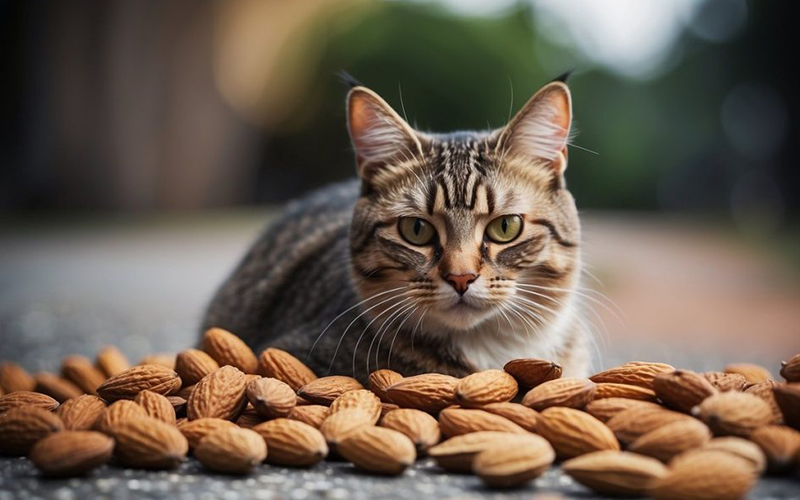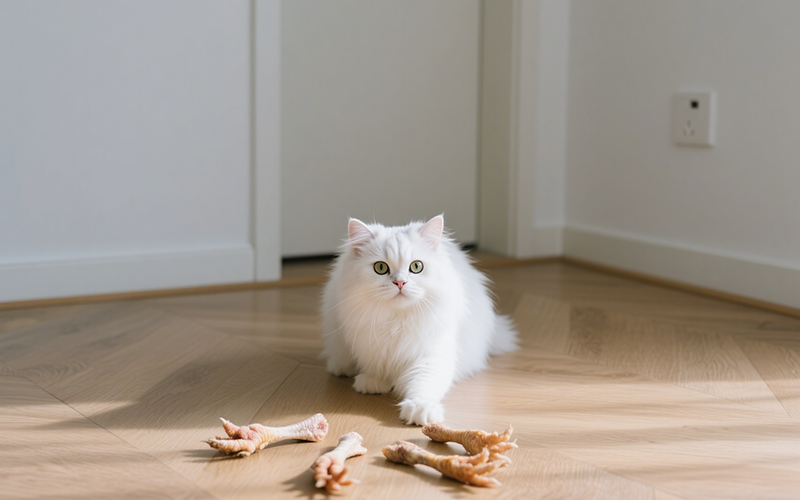Can Cats Eat Almonds? A Guide to Feeding Almonds to Your Cat
- 24 Feb 2025 14:39
Almonds are a popular snack for humans, often praised for their health benefits, including being a good source of healthy fats, protein, and fiber. But when it comes to your cat, the question remains: Can cats eat almonds? While almonds themselves are not toxic to cats, they are not an ideal food choice for them. In this article, we’ll explore whether almonds are safe for cats to eat, the potential risks associated with feeding almonds to your feline friend, and what alternatives might be safer.

Are Almonds Safe for Cats?
Technically, almonds are not toxic to cats. However, there are several reasons why feeding almonds to your cat is not recommended:
Difficult to Digest
Almonds are quite hard and dense, making them difficult for your cat to chew and digest properly. Cats have relatively small teeth compared to humans, and chewing on something as hard as almonds could lead to dental damage or choking if the almond gets stuck in their throat.High Fat Content
Almonds are high in fat, which can be hard on a cat’s digestive system. While fats are a necessary part of a cat’s diet, too much fat can lead to weight gain, obesity, and even pancreatitis, a potentially serious condition. Cats generally don’t need foods that are so high in fat and calories that aren’t specifically formulated for them.Potential for Toxicity in Large Amounts
While almonds aren’t inherently toxic to cats, eating them in large amounts could cause problems. The high fat and calorie content could lead to gastrointestinal issues like vomiting, diarrhea, or stomach discomfort. Additionally, almonds, especially when salted, could lead to sodium toxicity, which can cause symptoms like lethargy, excessive thirst, and urination problems.Choking Hazard
Whole almonds are a significant choking hazard for cats, particularly if they try to swallow them without chewing properly. The size and shape of almonds can make them hard for cats to break down, and a large piece could easily get stuck in their throat or digestive tract, causing an obstruction.
Are Almonds Toxic to Cats?
No, almonds themselves are not considered toxic to cats in the way that certain other foods, such as onions or chocolate, are. However, it’s still important to exercise caution when it comes to feeding almonds to your cat, as consuming them in large amounts could lead to digestive upset, choking, or more severe health issues like pancreatitis.
Some other nuts, like macadamia nuts, are toxic to cats, so it’s crucial to differentiate between which nuts are safe and which ones are not. Almonds fall into the safer category, but their overall nutritional value and potential health risks outweigh any benefits they might provide for your cat.
Risks of Feeding Almonds to Cats
Here are the primary risks associated with feeding almonds to cats:
Obesity
Almonds are calorie-dense and contain significant amounts of fat. Feeding your cat too many almonds can lead to weight gain and increase the risk of obesity, which is linked to several health issues, including diabetes, joint problems, and heart disease.Gastrointestinal Upset
Because almonds are not a natural food for cats, consuming them could result in gastrointestinal issues, such as vomiting, diarrhea, or constipation. Cats’ digestive systems are not designed to process plant-based foods like nuts, so it’s likely to cause discomfort.Choking or Blockages
As mentioned, almonds are a choking hazard, particularly when consumed whole. If your cat swallows an almond that doesn’t break down properly, it could get stuck in their throat or intestines, leading to potential blockages that require medical intervention.Salt or Sweeteners
Many almonds that are sold as snacks are salted or flavored with sweeteners like xylitol, which is highly toxic to cats. If the almonds are seasoned with salt or artificial sweeteners, they could be dangerous for your pet. Always avoid feeding your cat any almonds that are processed or flavored.
What Should You Do if Your Cat Eats Almonds?
If your cat has eaten a small amount of almonds, it’s likely that they will be okay, but you should keep an eye on them for any signs of digestive discomfort. Here are the steps to take if your cat eats almonds:
Observe for Symptoms
Watch for signs of vomiting, diarrhea, lethargy, or loss of appetite. If your cat shows any of these symptoms after eating almonds, it’s a good idea to call your veterinarian for advice.Ensure They Drink Water
Make sure your cat has access to fresh water at all times, especially after eating something that might upset their stomach. Staying hydrated is important for helping them digest and flush out any potential irritants.Avoid Giving Almonds in the Future
To prevent future issues, avoid feeding almonds to your cat altogether. There are plenty of other treats and snacks that are safer and more appropriate for their diet.
Safer Treat Alternatives for Cats
Instead of almonds, there are many other treats that are both safe and nutritious for your cat. Here are a few alternatives:
Cooked Meat
Cats are obligate carnivores, meaning their bodies are adapted to digest animal-based proteins. Small pieces of plain, cooked chicken, turkey, or beef make excellent treats for your cat and are high in protein without the risks associated with nuts.Cat-Specific Treats
There are many commercial cat treats available that are designed to be safe and nutritious for felines. Look for treats that are high in protein and low in fat to ensure they meet your cat’s dietary needs.Catnip
Most cats love catnip, and it’s completely safe for them to eat. It provides a fun and natural way for your cat to indulge, and it doesn’t carry the health risks of almonds.Baby Carrots (in moderation)
Some cats enjoy the crunch of baby carrots. They are low in calories and provide a nice texture for your cat to enjoy. Just be sure to serve them in small pieces to avoid any choking hazards.
Should You Use PettureX for Your Cat’s Health?
If you’re ever unsure about what foods are safe for your cat or need advice on creating a balanced diet, consider using PettureX. PettureX offers 24/7 online consultations with pet health professionals, so you can get expert guidance on feeding your cat and ensuring they stay healthy.
Conclusion: Can Cats Eat Almonds?
No, cats should not eat almonds regularly, and it’s best to avoid feeding them almonds altogether. While almonds are not toxic to cats, they present several risks, including digestive upset, choking hazards, and weight gain. Additionally, almonds are not a necessary or appropriate part of a cat’s diet.
Instead of almonds, consider offering your cat safe and nutritious treats like cooked meat, catnip, or commercial cat treats. If you’re ever in doubt about what foods are safe for your cat or have any dietary concerns, PettureX is always available for 24/7 consultations to help keep your cat happy and healthy.
Related

Can Cats Eat Egg Yolk Raw? A Vet's In-Depth Guide to Feline Nutrition & Safety
- 10 Jun 2025
Can Cats Eat Dog Kibble? Unpacking the Nutritional Mismatch!
- 29 May 2025
Can Cats Eat Deli Turkey? Slicing Through the Facts for Your Feline!
- 29 May 2025
Can Cats Eat Deer Meat? Exploring Venison for Your Feline!
- 28 May 2025
Can Cats Eat Corned Beef? Unpacking This Salty Human Delicacy!
- 28 May 2025
Can Cats Eat Cooked Rice? The Grain Truth for Your Feline Friend!
- 27 May 2025
Can Cats Eat Cornbread? A Crumb of Truth for Curious Cat Owners!
- 27 May 2025
Can Cats Eat Cooked Meat? Sizzling Facts for Your Feline's Feast!
- 26 May 2025
Can Cats Eat Chili? Spicing Up the Truth About This Human Dish!
- 26 May 2025
Can Cats Eat Chicken Feet? A Paw-sitive or Negative Treat?
- 24 May 2025
